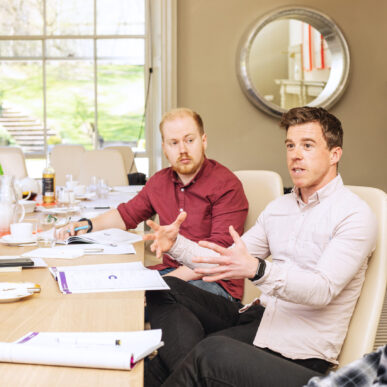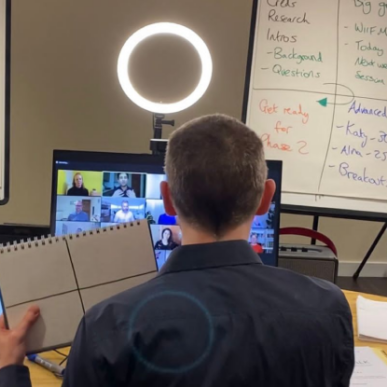“There’s a huge difference between talking with children and talking to children”
How Parents Play A Critical Role In Reducing Children’s Long-Term Communication Difficulties
Growing up, I struggled to communicate effectively at school.
I found it hard to understand social dynamics and interactions. ‘Banter’ was an alien language to me. It sounded like people insulting each other, then laughing about it! My own attempts at small talk were disastrous — I’d end up offending people instead of connecting.
As I got older, I realized my difficulties with speech, language, and communication — important tools we all need to thrive in the 21st century — continued to plague me as an adult.
That’s why I was so excited to have Mary Hartshorne as a guest on my Born To Speak podcast to discuss how early childhood speech development can have a positive impact on our communication skills as adults.
Mary is the Director of Impact at ICAN, an organization dedicated to helping children develop speech and language skills, and she knows how crucial communication can be for early childhood brain development.
She explained to me that language is essential for building relationships, learning, and navigating life. Not only is it how children express their needs and thoughts, but it also helps them relate to and understand others. Yet 1.4 million children — around 2 or 3 in every classroom — have long-term communication difficulties, and many parents greatly underestimate the importance of language skills.
If you’re a parent wondering how you can best prepare your child for the future, here’s her advice on supporting communication development:
There’s a huge difference between talking with children and talking to children.
Good communication involves so much more than speech.
In order for children to actively learn to talk, adults have to listen. It’s not enough to simply talk to your child. They need to participate, as well.
“It is that back and forth,” Mary told me. “When we’re working with parents of very young children, we talk about the importance of not asking loads and loads of questions like, ‘What’s that?’ ‘What’s daddy wearing?’ ‘What color is that?’ ‘What are you doing?’”
Most of the time, the answer is “nothing” — and the conversation ends.
Instead, approach the interaction as more of a commentary. For example, if a child is playing with their toys, say something like: “That looks like a lot of fun.” It gives the child space to make a comment and join the conversation without the pressure to provide an answer.
If you are going to ask a question, make it specific. Say, “Did anything make you laugh today?” or, “What was the most exciting thing you did today?” Doing so takes the pressure off the child to formulate a response and gives them time to think about what they’re experiencing.
Parents can also develop their children’s communication efforts by encouraging and establishing a time for a healthy back-and-forth conversation. That means both engaging and listening to your child in active conversation.
Once you understand how to talk to your child, then you can take steps to walk through communication challenges together.
We all struggle to communicate at some point. Here are a few of Mary’s tips to help identify problem areas and overcome them.
- Recognize where your child struggles with communication. The first step is identifying situations that make it difficult for your child to effectively communicate. That could be playing a team sport, giving a school presentation, or doing homework. Whatever the case, being aware of challenges beforehand will allow you to prepare both yourself and your child for a more positive outcome.
- Encourage your child to tell a story they know well. Being comfortable allows for better communication. When your child attempts to recall ideas that are familiar, such as telling a story of their favorite toy, they’ll have an easier time expressing themselves in a stressful situation.
- Organize your thoughts so children can understand you better. Make a check-list or bullet points to stay focused. When you establish your thoughts this way it will help you articulate your main points more clearly. That kind of preparation and thinking can be very useful in your ability to communicate with your child.
- Practice talking things through with your child. This will help them to consolidate their thoughts and strengthen their ideas while giving them the confidence to rehearse those reflections aloud.
While not all of us are natural-born speakers, we can learn to be better communicators. And, by understanding what encourages healthy speech and language skills from an early age, parents can help their children become better communicators, too.
To learn more about how we can help you please contact our team.




















